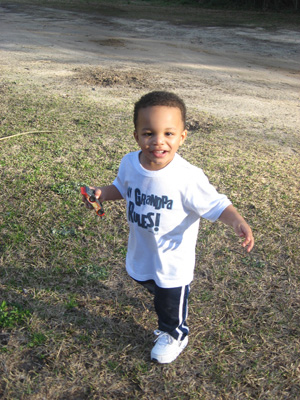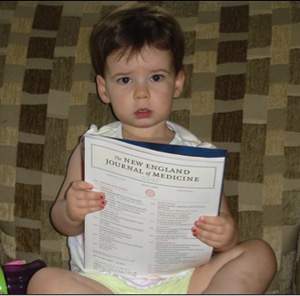G2104
Ages and Stages: Toddler (12-24 Months)
During the second year of development, toddlers grow and develop rapidly as they learn new things and explore their world. Learn what milestones to watch for and how you can provide a safe and supportive environment for your child’s development.
Jacqueline M. Guzman, Ruth E. Vonderohe, Gail L. Brand, Marilyn S. Fox, Lisa M. Poppe, LaDonna A. Werth, Mary E. Nelson, and Leslie Crandall, Extension Educators
Tonia R. Durden, Early Childhood Extension Specialist
Rasheema J. Pitt, Graduate Assistant in Research and Extension
- Physical Development Milestones
- Cognitive Development Milestones
- Social and Emotional Development Milestones
- A Guide for Toddler Parents and Caregivers
- Resources
|
Children 12 to 24 months old are learning, exploring, and communicating at a rapid rate, growing from dependent infants to more independent toddlers. They may challenge the patience, sense of humor, and even common sense of a parent or caregiver. Be prepared to “baby proof” the entire home, yard, and outside environments. This stage can be fun and rewarding as you guide your toddler through simple learning experiences. Keep in mind the following general developmental milestones for the busy toddler in your life.
Physical Development Milestones
By 18 Months
- Motor skills are developing rapidly and independence can be an issue for adults (for example, as toddlers begin to learn how to climb onto and down from furniture unassisted).
- Coordination is developed from sitting down, standing alone, or walking independently.
- A child can bend and pick up objects from a standing position. • Fine motor skills become more refined. For example, children can pick up small objects, with fingers, that often end up in his/her mouth.
By 24 Months
- Fine motor skills are improving, allowing toddlers to scribble and pour contents from one container into another.
- Eye-hand coordination improves and enhances accuracy in placement (Figure 1), direction, and spatial awareness (for example, throwing a ball, stacking or lining up blocks).
- Toddlers can move their bodies up and down, pick up items while walking, stand on tip toes, run, and walk up and down stairs with support.
|
Cognitive Development Milestones
By 18 Months
- Toddlers will imitate sounds, recognize objects by name, and understand and follow two- and three-step directions.
- They understand more than they can verbalize and make requests through gestures, pointing, and single words. At times this can be frustrating for both adult and child.
By 24 Months
- With a vocabulary of 200-300 words, they can use two or three word sentences and mimic words spoken by others. Caregivers can help toddlers expand their language skills by responding to one word sentences with simple questions or statements. For example, when he or she says “milk”, the caregiver can ask “Would you like some milk?”
- Toddlers demonstrate a great need for independence and develop self-help skills.
- Their attention span increases. They will go from pointing and identifying objects in books to being able to listen to short stories (Figure 2).
- Use of symbols and ideas in communication, memory capacity, and imagination increase.
Social and Emotional Development Milestones
By 18 Months
- “No” is frequently used and sharing is difficult.
- They like to imitate and repeat sounds, words, and even the behaviors of parents, caregivers, and other children and often imitate these behaviors when playing or pretending.
- Temper tantrums are common. The toddler may become easily frustrated because there are many things they want to do, but are unable to do yet. As communication skills develop, tantrums become less frequent.
By 24 Months
- “Me” and “mine” are among a toddler’s favorite words.
- Exploration and play become more complex and may involve toys that lend themselves to imaginary play.
- Play with peers becomes more exciting and attention from adults is enjoyed.
A Guide for Toddler Parents and Caregivers
- Remember that you are the first and most important teacher in the life of a toddler. By guiding a child’s simple, everyday activities, you are providing the building blocks to help him/her grow up healthy and ready for success.
- At this stage he/she is moving independently and wants to explore and learn, so safety is of the greatest importance. Be certain to child-proof a toddler’s environment by getting down to their eye level to see all the possible dangers from his or her point of view.
- Remember that how you respond impacts the child’s behavior. Begin now to teach children to use positive behaviors and social skills rather than emotional reactions.
- Recognize the child’s emotions by giving it a name (I see that you are frustrated) and help him/her redirect or calm down. Remember to stay calm, pay attention, and always reinforce positive behavior.
- Routines and consistency help a child feel safe and secure. Routines also teach sequencing and patterns, for example, after naptime, it is snack time, story time, and then mommy will pick me up, etc. Knowing what to expect minimizes stress in children as well as parents and caregivers.
- Creating opportunities for a child to help out with class or household chores teaches them simple problem solving, makes them feel helpful, and helps build self-esteem. Provide him/her with a towel or sponge to wipe down objects or a broom to sweep the floor. Show them how to pick up toys and place them in a toy box.
- Provide items that encourage imaginative play and creativity. For example, a box of dress-up clothes, kitchen items, sand, water, drawing materials, and music all allow a child to make discoveries in more complex ways using his/her imagination.
- Remember, it’s important to interact with a toddler. Get down on the floor, crawl, toss objects, play peek-a-boo, read to him/her, and remember to cuddle with your little one. This is what he/she needs the most.
Resources
Publications
Ages & Stages for Caregivers, 12 - 18 months by Mary F. Longo, Kathy L. Reschke, and Cheryl Barber, 2002. ASC-4-02 Ohio State University.
Ages & Stages for Caregivers, 18 - 24 months by Mary F. Longo, Kathy L. Reschke, and Cheryl Barber, 2002. ASC-4-02 Ohio State University.
Fun to Play, Ready To Learn Activity Guide, University of Nebraska–Lincoln Extension, 2007.
Make the Most of Playtime at http://Vanderbilt.edu/csefel. The Center on the Social and Emotional Foundations for Early Learning, Vanderbilt University.
Teaching Your Child to: Identify and Express Emotions at http://Vanderbilt.edu/csefel. The Center on the Social and Emotional Foundations for Early Learning, Vanderbilt University.
Websites
Center for Disease Control and Prevention: Infants and Toddlers, http://www.cdc.gov/parents/infants
Parenting and Just in Time Parenting Newsletter: www.extension.org/parenting Use code: NE10JITP UNL
Extension Child and Youth Development: http://www.extension.unl.edu/web/child
UNL Extension Building Better Children Facebook page: http://www.facebook.com/buildingbetterchildren
Zero to Three: National Center for Infants and Toddlers: www.zerotothree.org
This publication has been peer reviewed.
Visit the University of Nebraska–Lincoln Extension Publications website for more publications.
Index: Families
Childhood
Issued November 2011

